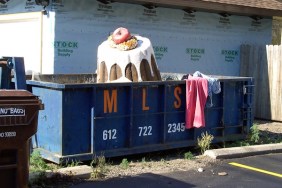Beautiful and untamed, the jungle can be an inhospitable setting for human inhabitance when dwellings are not designed in harmony with the climate and landscape. These 12 rainforest homes, resorts and communities work with their surroundings – and often very hot and humid weather – using such architectural features as slatted wooden window coverings, yet maintain a vital connection to nature with floor-to-ceiling windows and verandahs aplenty.
Shell House by ARTechnic, Japan
(images via: archicentral)
Making your way through the humid forests of Karuizawa, Japan, a giant shell hovering three and a half feet above the ground is not exactly a sight you expect to see. Architects ARTechnic were inspired by an unlikely combination of natural shell shapes and the concept of humans taking over an abandoned spacecraft. The concrete materials, a mold-preventing floor-heating system and the fact that the building is off the ground all help it stand up to a harsh wet yet cold environment that takes a heavy toll on many other structures in the area.
Tropical Bamboo Home, Costa Rica
(images via: benjamin garcia saxe)
This beautiful bamboo home was designed by architect Benjamin Garcia Saxe for his mother, combining local building traditions with modern techniques to engage the home’s jungle environment. Open to the outdoors, the home features exterior walls made of angled bamboo poles that prevent water from getting in but allow air flow for natural cooling, and
BR House by Marcio Kogan, Brazil
(images via: archdaily)
In the dense rainforest outside Rio de Janeiro lies this angular modernist home, which stands out in stark contrast – quite deliberately – to its natural environment. The BR house has been raised on thick tree trunk-like pillars to place the inhabitants at the level of the forest canopy, making the structure seem as if it’s supported by the trees. Massive glass walls further blur the lines between inside and outside.
Alila Villas Uluwatu, Bali
(images via: contemporist)
Wishing to move away from the traditional ornate dark wood, reeds and thatch roofing of typical Balinese architecture, Singapore-based architecture firm WOHA enhanced this flat-roofed modern structure with bronze, reclaimed wood and marble. The residential villas and hotel features pool cabanas with slatted wood that not only makes a strong design statement, but provides privacy and allows air to circulate.
Lofted Forest Home by Robert Harvey Oshatz
(images via: oshatz.com)
The curving organic forms and natural materials of this structure by architect Robert Harvey Oshatz seems as if it could have grown out of the forest, calling to mind knots of wood and twisting branches. The curves, in fact, are strategically placed to take full advantage of the space in between the trees that surround the building, giving it the feel of a huge treehouse.
Finca Bellavista Treehouse Resort, Costa Rica
(images via: inhabitat)
Treehouses of all sorts are a natural in jungle environments, and Finca Bellavista – an eco village in Costa Rica – is a veritable display of the various styles and designs that are possible, letting residents create their own sustainable structures in the treetops. Described as the world’s first planned, modern treehouse community, Finca Bellavista features a large community complex with a dining hall and an open-air lounge as well as a “Sky Trail” transportation network of hanging boardwalks.
Modern Rainforest Home in Rural Costa Rica
(images via: spg architects)
Placed on an abandoned concrete foundation and core steel structural frame, this ‘refab’ modern home in the jungle of Costa Rica reused the displaced timber that was cleared prior to construction. Floor-to-ceiling windows provide practically uninterrupted views of the forest and the sea, and an infinity pool enhances the balance between clean, contemporary architecture and immersion in the untamed setting.
Pier House, Brazil
(images via: archdaily)
Built to house a sailboat during the week and its owners on the weekends, the Pier House in Paraty, Brazil is divided into two volumes, the low-lying boathouse and the larger white structure of the house itself. The house, designed by Gabriel Grinspum and Mariana Simas, bridges the space between the water and the jungle behind it, utilizing traditional ‘muxarabi’ slatted windows to filter the light and provide ventilation.
V-Houses by Heinz Legler, Mexico
(images via: archdaily)
Open to the warm winds of the Pacific Ocean, the prefabricated V-Houses provide a rustic modern jungle retreat in Yelapa, Mexico, outside of Puerto Vallarta. Three of the resort’s guest houses stand out from the trees, made out of steel, plywood and red corrugated iron roofs.
The Green Village by Ibuku, Bali
(images via: green village bali)
Back to Bali, this beautiful green village of bamboo homes is a master-planned community built along a river by Balinese firm Ibuku. Literally everything in the village’s first completed home is made from bamboo, from the walls and window frames to the furniture and cabinets.
YTL Residence, Kuala Lumpur
(images via: gradient magazine)
A clear glass facade covered in slatted wood – again, for filtering sunlight and providing privacy yet still allowing a view – is among the standout features of the YTL residence in Kuala Lumpur. Designed by Paris-based Jouin Manku for a theoretical ‘Malaysian power family’, the residence is sleek and contemporary, raised above the treetops to provide the best possible view. Greenery planted along the upper deck brings the jungle closer to the home even as the architecture seeks to separate itself from nature.
Ecological Resort Concept, Dominica
(images via: archdaily)
What does the future hold for jungle architecture? This concept for a sustainable future development along Mero Beach on the west coast of the Commonwealth of Dominica, a tropical island in the Caribbean, seeks to promote tourism in a way that is sensitive of the island’s rainforests. Designed by BURO II, which has already completed a project of similar scale in Guangzhou, China, the resort includes a mixture of villas, bungalows and apartments as well as retail, entertainment, a hotel, conference facilities and parking, but integrates these functions with the natural setting using sustainable materials, native landscaping and an architectural scale that does not distract from the beauty of the island itself.







